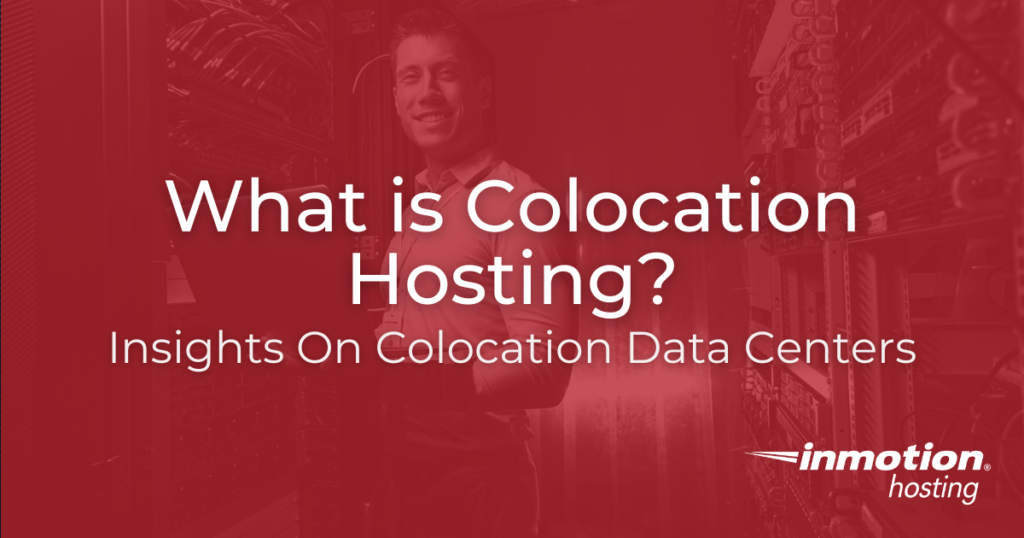
Colocation is a hosting service where businesses place their servers in data centers operated and managed by third-party experts. It’s a great option for businesses that want to control their servers without worrying about running a data center.
In this article, we’ll break down what colocation hosting is, what colocation services include, and how it compares to other types of hosting.
- What are Colocation Services?
- Benefits of Colocation Facilities
- Colocation vs Cloud
- How to Choose the Right Colocation Provider
What are Colocation Services?
Colocation services allow you to lease space within a data center to house your servers. You pay to use the data center’s space and resources while maintaining control over your computing hardware and software.
For many businesses, a data center provides physical security, HVAC, networking, and power to their servers. Likewise, the whole environment is optimized to be most suitable for your hardware.
In other words, you don’t need to haul around your hardware. Now, with bundled colocation and private cloud software, it’s easy to get the computer resources you need or add new hardware whenever you want.
Colocation Data Centers
Colocation services offer a range of important features to help you manage your servers. Here’s what you can expect:
- Physical Space to secure your servers. This space is designed to protect your equipment from damage and theft.
- Power Supply with backup generators so your servers stay running even during a power outage.
- Cooling Systems to keep your equipment from overheating.
- Internet Connectivity at high speeds so your servers can communicate quickly with the outside world.
- Security like camera surveillance to keep your hardware safe from unauthorized access.
With these services, you can focus on managing your servers without dealing with the costs and maintenance of owning a data center.
Benefits of Colocation Facilities
For most businesses, retail colocation offers tantalizing perks over an in-house network. If you’re not convinced that colocation beats a server closet in your building, here are a few points you could consider:
Location: Data centers are strategically located in optimal locations to handle the unexpected—weather, natural disasters, etc. Even if World War III should break out tomorrow, there’s a good chance your data center will be unaffected. Likewise, you could choose data centers by location to make sure your data is the best place for your apps.
Top-notch Infrastructure: Even with a solid plan, often unexpected elements are likely to affect your operation. Data centers make it their business to account for every disaster with backup resources and disaster plans.
Cost Savings: You don’t need to build and maintain your own data center, which saves you a lot of money. Instead, you pay for the space and services you use.
Effortless Expansion: It’s easy to add more servers or upgrade your equipment when you need it. Data centers can accommodate your changing needs without hauling around equipment. Then, you can use your private cloud provider’s control panel to provision new hardware.
Full Control: You have complete control over your equipment. You can customize your hardware and software exactly how you need.
Colocation is a smart choice for businesses that need reliable and secure server management without the hassle of running a data center. These benefits give you freedom and peace of mind to focus your efforts on business strategy and development.
Colocation vs Cloud — What’s The Difference?
While colocation gives businesses full control over their physical servers, cloud hosting is another option that works very differently.
A private cloud gives you virtualization resources and colocation in one package. You can create routers, networks, and security groups and launch compute instances for a fraction of the cost of public cloud providers like AWS, Google Cloud, and Microsoft Azure.
And, If you need additional hardware, you can request it from your cloud service provider — usually, with a saner sticker price. You also won’t need to dispatch IT people to the data center to install your hardware; you can have it on demand.
This can be much easier for some businesses. Your own private cloud means effortless redundancy on your network and virtually endless computational resources at your fingertips.
Which is better: colocation or cloud hosting? It depends on your business needs. Colocation may be the right choice if you need total server control. But if you’re looking for an option that is easier to manage, cloud hosting is often the right fit.
InMotion Hosting’s cloud services provide an excellent alternative to colocation. Our cloud services offer powerful, reliable, and scalable solutions, without you buying or managing hardware. With InMotion Hosting, you can focus on growing your business while we handle all the technical details behind the scenes.
With our Cloud Server Hosting, you can deploy a lightning-fast, reliable cloud platform with built-in redundancy – ensuring the availability of your environment!
How to Choose the Right Colocation Data Center
Naturally, choosing the right colocation provider should be based on getting the most for your money. So, here are some things you should consider to pick the right host:
Proximity. Choose a data center close to your business to minimize latency and improve performance.
Reputation. Look for a provider with a good reputation for reliability and customer service.
Bandwidth and Connectivity: Make sure the provider you’re considering offers high-speed internet and enough bandwidth for your needs.
Support: Ensure the provider can accommodate your future growth.
These factors will help you find a colocation provider that meets your business needs and ensures your servers are in good hands.
